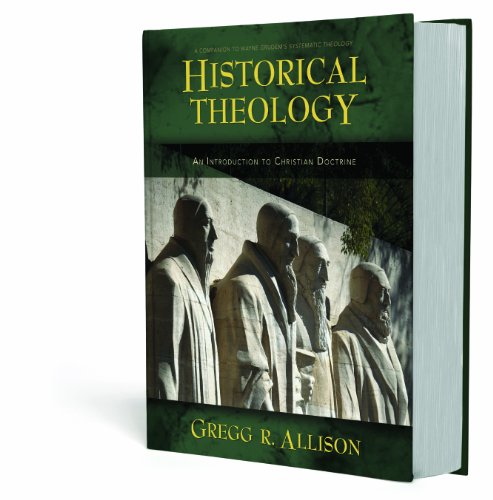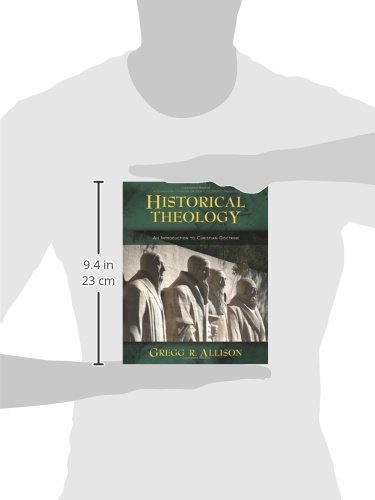Customer Services
Copyright © 2025 Desertcart Holdings Limited
Desert Online General Trading LLC
Dubai, United Arab Emirates





Historical Theology: An Introduction to Christian Doctrine
C**H
Well Done
I only have 1 complaint. Apparently Allison turned in the largest manuscript Zondervan had ever received and they asked him to trim it down significantly. For my purpose, I think that thinned out the work too much. They gave him an impossible task of being comprehensive, covering as many topics as he did and doing it in as little space as he did. It's obvious to me that many otherwise important theologians had to be dismissed for sake of conciseness. Otherwise, this is a very well-done work & I appreciate it being topical rather than chronological. I believe historical theology should be taught chronologically inside church history books -- just as Nick Needham did in his 4-volume series on church history which is a phenomenal work. Otherwise, if it's going to be a paired reading with a systematic theology it should be arranged topically like Greg Allison has done.
B**N
Prompted me to leave Protestantism
This book is excellent. Doctrinal issues are categorized and systematically traced from early church sources through the middle ages, reformation and beyond. I read this while studying church history and, after being a Baptist for over thirty years, have now left Protestantism altogether. But, I am not converting to Roman Catholicism. There is a church older than Rome. The church that holds to apostolic tradition is Eastern Orthodoxy. By God's grace I am moving toward Orthodoxy and this book is one of the things that convinced me.
T**S
Something For Lambs And Elephants
“Historical Theology” is a concise, consequential, constructive, conversant, courteous introduction to how many major doctrines have become part of today’s systematic theologies. Gregory the Great said about Scripture, “It is almost like a river, both shallow and deep, in which a lamb may walk and an elephant swim.” “Historical Theology” is not Scripture, but it also has value for lambs and elephants, as it can be used as a textbook for the student, a convenient reference book for the pastor and an accessible survey for the beginner. I think my favorite things about it were the creative topical arrangement (correlated with Grudem’s “Systematic Theology”), the clear writing style and the helpful glossary of leaders and movements. My kindle edition did have one page where some information about elders and deacons was typographically garbled, but it wasn’t a big deal. For me, the book helped refine my own systematic theology, as well as fanned the flame of my devotion. Good stuff for lambs and elephants and for the head and the heart.
M**G
GOOD SCHOLARSHIP ON AN IMPORTANT TOPIC THAT NEEDS MORE ATTENTION
This text was intended as a companion to Wayne Grudem's systematic theology. but it is also valuable as a stand-alone text. Historical theology seems to be vanishing into the horizon lately with the new post-post modern emphases; this trend needs to be reversed because the doctrinal history of Christianity is indispensable and, sadly, not well known enough even by the church. The plus-es of this text: it is a sprawling, comprehensive work which targets what it claims to target: the historical development of Christian theology. The author is clear in the presentation and the work is adequately researched. Its perspective is western evangelical. The minus-es: the organization of the book takes some getting used to; at times the reader gets the feeling that the doctrine is driving the history, rather than the more accustomed flow of theology being pronounced within the context of historical narrative. In other words, it is a topical rather than historical-narrative arrangement, and within those topics the theology is presented under time-period sub-categories. This may present problems. Theology never develops within that type of "lab," i.e., the confines of broad theological categories; it develops more naturally within its precise (not broad) historical setting. When we move events over to fit into topical categories we run the risk of creating an artificial rather than natural grid; many of the fathers made pronouncements on a particular issue within the wide scope of a period, but often did not decide upon precisely the same issue or even nuances of the same issue. To group them together topically seems at times unfair or even forced. Also, footnote data does not often make those distinctions clear. I just think this book would have been outstanding if it read as a history book with micro-focus on theology and the comparative study of doctrinal development throughout the timeline. With regard to the latter, there are gaps regarding the place each doctrine holds in the broadest view of Christian history. I think comparative analysis of theological points even within the same period but definitely throughout the historical span, should attempt to show the nuance differences, as well as the growth, maturity and evolution of the doctrinal pronouncements. I think those connections need to be explicitly made for the student, to avoid reader misinterpretation. I also think long-range comparative analysis is key to really understanding the discipline because it provides a totality perspective when the temptation may be simply to see history as incremental and detached. At times I felt that the goal in this work may have been more simply to get the enormous quantity of information out (which of course is part of the task but not all of the task.) Certainly, Allison is to be credited for his skill in handling an enormous amount of information well. But the finer points of comparative analysis need not add inordinately to the task; often this is accomplished visually for the student by use of chart and graph implementation which is not available in this work. Please do not misunderstand, the author does indeed delve into certain critical areas responsibly and faithfully, but the larger framework analysis would have added more completeness, in my opinion. An overall fairly solid work on the comprehensiveness of the historical data. On the other components, it is on the scale of about a B or B-, all things considered.
D**M
Wonderful but two gripes
This is a delightful read but I have two gripes: the book is wonderfully footnoted, I only wish they were parallel to the text rather than at the bottom of page. I found my eyes dancing between the references and the text. Second, oh how I wish you had an authors index! The general index simply did no justice! Thanks for your labors to this worthy read my friend!
A**R
Nice
Nice book
L**Z
Great Read! Used it in seminary.
Still using this text as a teacher's aid.
K**E
Gregg Allison is clear, covering complex issues with helpful ...
Gregg Allison is clear, covering complex issues with helpful statements and not confusing matters. I'm thankful for this book, I also don't find it's matter too heavy to read which sometimes happens with theology books.
R**U
Excellent book
This book is a very excellent book. I learn many things about the beginnings of doctrines. I recommend it to all pastors , teachers and students. Junior Régis
S**E
Easy Read
This is a great book for those who are new to this topic, it is easy to understand and the language is not as complex as some theological texts on the market. I would recommend it to those who are starting out in theology.
Trustpilot
3 weeks ago
2 weeks ago